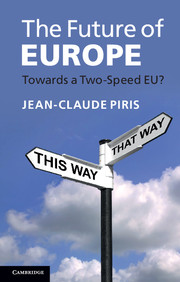Book contents
- Frontmatter
- Contents
- Foreword
- Acknowledgements
- Introduction
- Chapter 1 The continuing need for a strong European Union in the foreseeable future
- Chapter 2 An assessment of the present situation of the European Union
- Chapter 3 First option: substantially revising the European Union treaties
- Chapter 4 Second option: continuing on the present path while developing further closer cooperation
- Chapter 5 Third option: politically progressing towards a two-speed Europe
- Chapter 6 Fourth option: legally building a two-speed Europe
- Conclusion
- Further reading
- Index
- References
Chapter 4 - Second option: continuing on the present path while developing further closer cooperation
Published online by Cambridge University Press: 05 June 2012
- Frontmatter
- Contents
- Foreword
- Acknowledgements
- Introduction
- Chapter 1 The continuing need for a strong European Union in the foreseeable future
- Chapter 2 An assessment of the present situation of the European Union
- Chapter 3 First option: substantially revising the European Union treaties
- Chapter 4 Second option: continuing on the present path while developing further closer cooperation
- Chapter 5 Third option: politically progressing towards a two-speed Europe
- Chapter 6 Fourth option: legally building a two-speed Europe
- Conclusion
- Further reading
- Index
- References
Summary
In order to attain the objectives set out in the treaties, the EU institutions impose obligations on Member States on the basis of the competences that have been conferred on the EU. In areas where no such obligations are imposed, either because the EU does not have any power or because its institutions have decided not to use it, the Member States remain free to act and take decisions. In such a case, they might do this on their own or, if they so wish, in cooperation with other states that may also be EU members. Such a ‘closer’ cooperation is legally possible. It allows those Member States that want to cooperate together to progress on some issues or to develop some policies, whereas other EU Member States do not participate.
A number of Member States do practise closer cooperation in economic, industrial, military, cultural or other fields outside the EU institutional framework. The EU treaties do not forbid this so long as EU law is respected.
- Type
- Chapter
- Information
- The Future of EuropeTowards a Two-Speed EU?, pp. 61 - 105Publisher: Cambridge University PressPrint publication year: 2011



